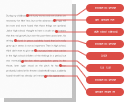Advice to Graduate School Recommendation Letter Writers
作者:互联网 来源:互联网 2014-01-08
布朗大学教授从录取老师的角度讲述如何写推荐信,什么样的推荐信更受外国老师的青睐。(英文版,附链接。)
源网址:http://cs.brown.edu/~sk/Memos/Grad-School-Recos/
Shriram Krishnamurthi(Professor of ComputerScience)
First version: 2008-03-25.Revised: 2008-03-26 (thanks, Kathi Fisler). Revised: 2010-10-21, 2010-11-20,2012-05-04.
Some years ago Iwas talking to a visiting scholar who was a faculty member in a foreigncountry. I asked her why letters from her country seemed to be so uninformative.She pointed out that there, faculty never read letters: they only writethem. Even graduate students are admitted purely on the basis of test scores.
The facts werehardly surprising—after all, this is the system I grew up with in India—butafter hearing the way she put it, the proverbial bulb lit up. If you neverevaluate letters yourself, how would you know what letters should and shouldn'tcontain? The feedback—admission decisions—is seemingly random, and therefore oflittle use. Hence this article.
Disclaimer: Thisis an extremely personal opinion. It doesn't represent the views of mydepartment or my university. More importantly, many faculty may disagree withthe opinions here, so use them with caution!
What this documentis about: Writing effective recommendation letters for PhD students applying tocomputer science PhD programs in the US.
Whom this is for:Letter-writers who are unsure of what makes for a good letter. This may alsohelp students prepare better dossiers to give their letter-writers. (A bravestudent might even point her letter-writer to this article.)
Also read: MorHarchol-Balter's comments, Michael Ernst's advice.
Why Letters Matter
Does anyone readthe letters at all? We do, rigorously, sometimes as carefully as we read aresearch paper: pen in hand, circling comments, annotating margins, noting whatthe letter did and didn't say.
In fact, lettersare so important, even a bad transcript can be offset by them. I know a studentwho got into a fine graduate program with just a 2.67 GPA. This is because his2.67 was special: he aced hard classes and got bored in easy ones. His letterspresumably said so, and illustrated this with several anecdotes. So, not every2.67 is equal, and your student's may be of just the right kind; but we won'tknow that without your letter.
My Constraints(or, The One-Minute Rule)
When I'm on thecommittee, I try to read every application; when I chair it, I make sure I do,some multiple times. That's many hundreds of applications in under a month.Factor in lots and lots of late letters, classes, etc., and it's clear I haveto work pretty fast.
For the firstpass—deciding whether the application deserves more time or not—I can afford tospend no more than about 6-7 minutes per application. (Keep in mind I've readmaybe a few thousand applications, so I've had practice.) If I decide the applicationis promising, I may spend over half an hour (in some cases, days!) on it. Butin those first 6-7 minutes, I have to:
·eyeball the student's research record
·form a summary of the transcript
·glance at the standardized test scores
·determine whether the statement is promising
·get the gist of 2-3 letters of recommendation
In practice, thatmeans I have about one minute to devote to the first reading of your letter.Now think about whether your letter works in this context. (For instance, someletter writers put a big, prominent paragraph of boilerplate legalese at thebeginning of their letter, which I have to read before I realize it'sirrelevant. Could you have buried that in a postscript? Was that the best useof my minute?)
Call this theOne-Minute Rule and write, read, and re-read your letter against this rulebefore sending it in.
Be Concrete
If you take awayjust one piece of concrete advice, let it be this.
The single biggestproblem with most letters is that they are filled with abstract generalitiesand infinitives. If we don't know you or your institution, we can't judge whatany of these statements mean relative to our standards. Always consider theillustrative anecdote:
Due to deadlinepressure, I asked him to grow a pumpkin in just one month. As you know it takesover 100 days to grow a pumpkin, but over the weekend he devised a new methodto accelerate their growth. On Monday morning I arrived to find not just apumpkin but a steaming, flavorful pie.
Anecdote aboutacts of raw coding are only so helpful in understanding research potential, butthey're better than nothing (see the section on Corporate Letters, below). Anextra book or paper they read, and demonstrated understanding of (again,be concrete about why you believe this), goes a long way.
Triangulation andCredibility
When we read aletter we're supposedly evaluating the student, but we're actually evaluatingthe letter-writer too. What I care about is not only what you think, but alsowhat I think of what you think. If I don't know you, I need to calibrate you.
Of course,sometimes information can hurt. If you praise research that is no harder thanwhat we assign our first-year undergraduate students, that tells us a lot aboutyour program, but not a lot positive. I saw precisely such a letter backin about 2002; to this day, I can name the college (and the student...). Untilthat program becomes a whole lot stronger, I wouldn't want to admit anyone fromit.
If you've beenholding back praise, tell us: If you haven't written a letter this strong since1998, and you've written two dozen letters in that time, it helps for us toknow that. Of course, be honest. If we take you at your word and your studentproves to be significantly weaker than your letter, we won't trust your futurerecommendations.
It also helps toknow your track record. Especially if you are a professor at a lesser-knownuniversity, tell us where your past graduates have gone. Even better, tell uswhere they are now (maybe the lack of name-recognition for your school meansthe students didn't go to well-known places initially, but if they did well andare now placed in good positions, that's good to know). Remember to compare thisstudent to that population.
Finally, tell us alittle about your background. A brief para of bio-sketch never hurts. If youpublish papers, tell us where. But keep it short: the letter is about thestudent, not you!
Ultimately,remember two things:
·Your most valuable resource is your credibility. If youare a credible letter-writer, we will take you at your word and, if one day youtell us about a stellar student, we will do everything we can to make room forher. But credibility is one-way: hard to acquire, easy to lose.
·You can't get a student in, but you can make a studentnot get in. That is, there is only so much you can say to get a studentadmitted, but if we come to distrust your letter, your next student isgoing to have a much harder time getting in. For “you”, substitute yourinstitution also.
Reporting on Research
At ahighly-competitive university like Brown, we want to know the student'sresearch potential. The best assessment of this is what they have already done.If you are their research advisor, you have a special obligation to them (andto us) in your letter:
·describe their work in your own words
·tell us what the student's contribution was
·tell us whether it succeeded or failed
·if it's ongoing, tell us why you think it will succeed
We rarely expectthe ideas to have originated from the student, but we would like to seesigns that they took ownership of the project, improved it in some way, refinedthe idea, and so on. Finally:
·put any publications in context
Students don'talways know how to do this. If you published a paper on the work, tell us aboutthe quality of the venue. In particular, students are poor at telling differentkinds of publications apart (tech report from conference poster fromresearch paper) and may even try to hide the distinction (I've seen thishappen). Help us understand what they really accomplished.
If you run asummer research center, you may get bombarded with letter requests from each ofyour students. I have seen such people write perfunctory one-paragraph letters.These hurt students, and are ultimately unethical. Someone gave you money torun that center; when you asked for it, you took on an obligation. Fulfill it,or else get out of the way. There are plenty of others who will gladly put thatmoney to better use.
Reporting on Courses
Naturally, yourmost significant contact with the student is likely to be in courses. Yet whatcould be a rich source of description is often the poorest: Mor Harchol-Balterreports that at CMU, they call a certain class of these “DWIC” letters (“didwell in class”), which are effectively useless.
Give us context.What textbook did you use? How much of it did you cover? Did the student takeit earlier than usual?
Don't just reportthe grade; put it in perspective. How many students got that grade or better?If your transcript isn't nuanced (e.g., at Brown we give only letter gradeswith no +/- decorations), fill it in. Did they do an exceptional job atsomething? (Tell us what they did!) Were they biased towards some aspect ofyour class? (For instance, in my programming languages course, some take muchbetter to the theoretical aspects, while others prefer the systems work. Thetranscript won't reveal this, but it's extremely valuable information for aprofessor trying to decide whether or not to recruit a student.)
Reporting on Personality
This is tricky,but it can help a potential advisor assess how good a fit the student will be.Some advisors work best with quiet, shy students, others with boisterous ones.Be as honest as necessary. For instance, I've had the pleasure of working withnumerous exceptional students, but a few have had more peculiar personalitiesthan the norm. In such cases, I write a “care and feeding” section (this goesback to the bit about credibility). I have never yet known this to be heldagainst the student.
Corporate Letters
An importantspecial case is the corporate letter: when you, the letter-writer, work inindustry and have no academic affiliation. Many corporate letters (like manyacademic letters, but more so) tend to be vapid, clearly written in a differentculture and for a different audience. Unless they actually did academicresearch with you, here are some suggestions for improving them.
A common mistakeis to focus on teamwork. This is important even in academia, but often this isthe primary focus of the letter, which makes it less valuable. Of coursewe care about it, but it's secondary to their technical skills.
·Tell us if they learned something particularly quickly,mastered a complex technology, or solved a problem others were stuck on. Giveus a paragraph of details.
·If you have a concrete reason to evaluate researchpotential, do so concretely. Otherwise, don't bother.
·Give us a brief bio-sketch, including educationalqualifications.
·Put the applicant in context, and tell us the context.It's fine to relate it to your own student days, or to your experience hiringstudents. E.g.:
Compared to thestudents I studied with at Cucumber and Melon University, and the ones I nowrecruit from there, I would put him in the top 10%.
Don't Personalize(or, How to Personalize)
Don't waste yourtime personalizing the letter for each school, unless you reallypersonalize it. I'm not impressed by your mail-merge program. Absolutely nobodycares that you don't list Brown's postal address at the top of the letter.Spend that extra minute or five making the letter better. Besides, invariably,you will mess up: every year we get a handful of letters stuffed in the wrongenvelope. (Just because they're good enough for Harvard doesn't mean they'regood enough for us! [I hope Greg Morrisett doesn't read this.])
Of course, youcould really personalize a letter by writing a paragraph specific to aninstitution. But only do this if you really have something to say. Forinstance, I sometimes write,
Hey folks—EvaEchidna is more dedicated than Jonas Jackaroo and every bit as smart as WalterWallaby, both of whom are past students of mine who appear to be thriving inyour program.
You could do thiswith LaTeX or Word macro trickery, but you know what I do? I just write theparagraph by hand. It's quicker, easier, and even has the feel of authenticity,because everyone knows professors can't afford machines that simulatehand-writing: only alumni offices have that kind of money on campus.
A simpler, butalso important, level of personalization is to take into account the quality ofthe target institution. Sometimes, students apply to schools well beyond theirquality, and you may not be able to talk them out of it (nor, perhaps, shouldyou; they're just exercising their freedom). You may consider having slightlydifferent letters, one for each level of institution. A cheap way to achievethe same effect is to simply mark different boxes in the tables you're asked tofill in (e.g., mark them in a higher percentile for schools where you thinkthey belong, and a lower percentile for places where they will be overmatched).
While we're at it,here's a great instance of customization gone wrong (the ellipses are mine, therest is literal text):
It is my pleasureto recommend ... be admitted to the PhD in Computer Science program at BrownUniversity. I am an associate professor in the Department of Computer Science,the University of ..., where I have taught for [THIS MANY] years.
Didn't evenproof-read it, eh?
Ask Your Studentfor Help
Ah yes! Here'swhere I tell you to ask the student to write a draft of their own letter. Not.
Asking students towrite even a draft of their own letter is one of the shabbiest practices I canimagine. Yes, I know, many otherwise respectable people do it (I've even hadmore than one letter-writer of mine—people I respect profoundly—ask me to). I'veheard arguments about how it helps a student demonstrate professionalism,maturity, and so on. This isn't the place to explain why I'm completelyunswayed.
So what do I mean?
I tellmy students to give me a listof everything about them that they think is relevant. I explicitly tell them tobrag (some students are shy and may not give themselves enough creditotherwise): filtering their input is my job, not theirs, and I say so.Sometimes I do get items that are over-the-top, but no harm done. Much moreoften a student will remind me of something they did that I had forgotten, butwas well worth remembering.
In particular, formy top research students who are currently working with me, I have no shortageof information. But for the others, or ones I haven't worked with in a while,this helps immensely. Some item suddenly brings them alive after several years,helping me reconstruct forgotten details and provide an illustration or two.
Tell Us About Relevant Things That Didn't Happen
Sometimes thenegative spaces also matter: a statement like
Despite my bestefforts to persuade her to work with me, Eva decided to spend her second summerworking for the Rocky Raccoon Corporation, a local maker of surveillanceequipment. Because of this I cannot say much about her research skills, but I'mtold she did good work there. Moreover, her experience in industry convincedher she would rather be in graduate school.
can, in somecontexts, tell the reader a lot.
Help Your Students Form a Strategy
It's veryfrustrating to get three essentially identical letters. If you are the advisor(or even simply someone who thinks the student deserves to do well), take alittle time to help students plan out their application strategy. Ask them whotheir other writers are, help them find writers who can highlight all theirstrengths, and identify pointless overlap. Summarize anything you think weshould know about: e.g.,
I know that Evadid a superb project with Prof Dolfenfuss—I was blown away by the creativity oftheir work on intrusion detection for raccoons that raid pumpkin patches. She'stold me she has asked Dr. D. for a letter, so I trust he will elaborate.
Just Say No
Don't write aletter because you're feeling badly for a student. We can tell from yourletter, and it won't help the student one bit. Just say no. If you really carefor the student, spend that time instead helping him find letter-writers whocan better get across his talents. Heck, maybe he shouldn't be applying tograduate school at all, at least not right now. A few minutes of your time maysave him years of his.
Practice the Fundamentals
Mail the darnedthing in on time! We don't begin to read applications until they are“sufficiently complete” to be worth the time. While you're crafting your prosefor the Paris Review (and fidgeting with the details of your mail mergeprogram), your student's folder is becoming close friends with the historic,200+-year-old, pre-Revolutionary War dust in the corner of someoffice building at Brown.
批改及润色体验馆 想知道您的作文、口语、文书将如何被我们的专家批改及润色吗? 查看更多
 马上体验口语批改
马上体验口语批改
 马上体验作文批改
马上体验作文批改
 马上体验文书润色
马上体验文书润色
作文题库:
托福-综合写作 托福-独立写作 雅思-小作文 雅思-大作文 GRE-Issue GRE-Argument GMAT-Argument SAT-Essay ACT-McGraw-Hill ACT-历年代表性作文题目考研-小作文 考研-大作文 四级-作文 六级-作文 专四-大作文 专四-小作文 专八-作文 高考-新课标一 高考-新课标二 高考-北京 高考-天津 高考-广东 高考-四川 高考-辽宁 高考-安徽 高考-福建 高考-湖南 高考-湖北 高考-陕西 高考-浙江 高考-山东 高考-上海 高考-重庆 高考-江苏 高考-江西 高考-杭州外国语学校 高考-郑州四中 高考-章丘
口语题库:
托福-Question 1 托福-Question 2 托福-Question 3 托福-Question 4 托福-Question 5 托福-Question 6 雅思-Part 1 雅思-Part 2 雅思-Part 3求职面试-500强企业高频通用英文面试题目100道 求职面试-各大企业常用场景英文面试题目
签证面签-你是谁 签证面签-你去做什么 签证面签-你有能力去做吗 签证面签-你会回来吗
留学面试-关于学校及专业 高考-高考口语
文书润色:
留学文书 学术论文 商务文书 求职文书 课程作业 书稿润色 学术论文试用 学术论文摘要使用有问题?请联系我们的在线专家
工作时间:09:00AM - 08:00PM
 专家在线
专家在线






